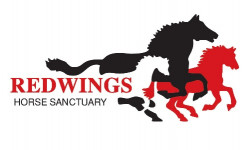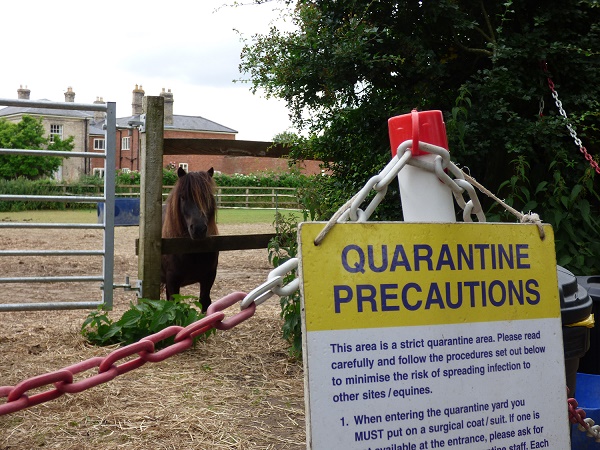Posted: 4th August 2023 | Back to news feed

Quarantine has been lifted at Redwings Horse Sanctuary’s Hapton site in Norfolk three weeks after a horse tested positive for strangles. The measures ensured no further horses were infected.
A single field of ponies within one of Redwings’ resident herds at their headquarters near Norwich was placed into precautionary quarantine last month.
Although the site is not a visitor centre, the charity, which is the biggest horse welfare charity in the UK, asked people who may have cause to walk through or attend a meeting at their HQ to adhere to the restrictions set up to prevent spread.

Nic de Brauwere, Head of Welfare and Behaviour at Redwings, said: “We routinely put precautionary quarantine in place on our farms when any equine shows possible signs of an infectious disease, as we did here. Once we had the positive diagnosis, we extended quarantine to all areas where possible spread might have taken place as a result of the normal movement of people and horses around the farm.
“We used blood tests and scoping to test horses that could have had direct or indirect contact with the case prior to the quarantine being set up and the good news is that none were infected or were themselves long term carriers.
“We’ve now passed the extended time period typically associated with transmission of the disease and have lifted quarantine in accordance with our protocols.
“Strangles is not airborne but spread by direct contact with infected material from affected horses, or indirectly through contamination of shared feed and water sources, people or objects. Moving our infected horse to the dedicated quarantine centre along with a close friend, and then isolating fields linked directly or indirectly to our patient, allowed us to contain it.”
The infected horse is an elderly resident who has been at Redwings for many years, and the charity hasn’t been managing any other cases of strangles at either this site or their quarantine yard, making it a puzzle as to how he became infected in the first place.
Nic said: “It’s very unusual to find a case in a longer-term resident, but we approach it in the same way to ensure we haven’t missed a disease getting through our net or finding a new way into the herd.
“The version of strangles we have identified is lacking certain key features that would typically be expected when one gets a positive test result. We will share the lessons from this case to contribute to wider knowledge of the disease.
“The infected horse remains under treatment at our quarantine centre. He is coping well with this, and we are aiming to resolve this unusual case so he can return to our fields.”
As well as leading Strangles Awareness Week during the first week of May, Redwings has campaigned to improve biosecurity procedures and tackle the stigma associated with the disease since 2018 and has recruited hundreds of horse owners, yard managers and equine professionals to their Stamp Out Strangles pledge which aims to incentivize better biosecurity before an outbreak happens.
Andie McPherson, Campaigns Manager at Redwings, said: “In light of this case we'd encourage horse owners to remember not to become complacent about strangles and to be prepared to respond to any signs of infectious disease until a specific cause like strangles can be ruled out.
“One way to be prepared for strangles is to take our Stamp Our Strangles Pledge and make that simple commitment to good biosecurity best practices. Don't forget to get your yard involved next May to help promote disease prevention.”
Strangles is the most diagnosed equine infectious disease worldwide. Symptoms of the contagious respiratory illness range, but include a high fever, laboured breathing, difficulty eating, depression, thick nasal discharge and painful abscesses. In severe cases Strangles can pose a risk to the horse’s life. There are complications in approximately 30% of cases and it is impossible to know which horses will require extra care and treatment. For the cost of a thermometer and spotting fever, owners can minimise scale and spread.
Please visit Redwings’ website to make your pledge to good biosecurity practices and find out more about strangles: https://www.redwings.org.uk/strangles/help-and-advice/what-is-strangles
The Equestrian Index newsfeed is compiled from articles submitted by advertising members and expresses the opinions of those members. Watsons Directories Ltd shall not be held liable for any inaccuracies or mis-statements therein.
